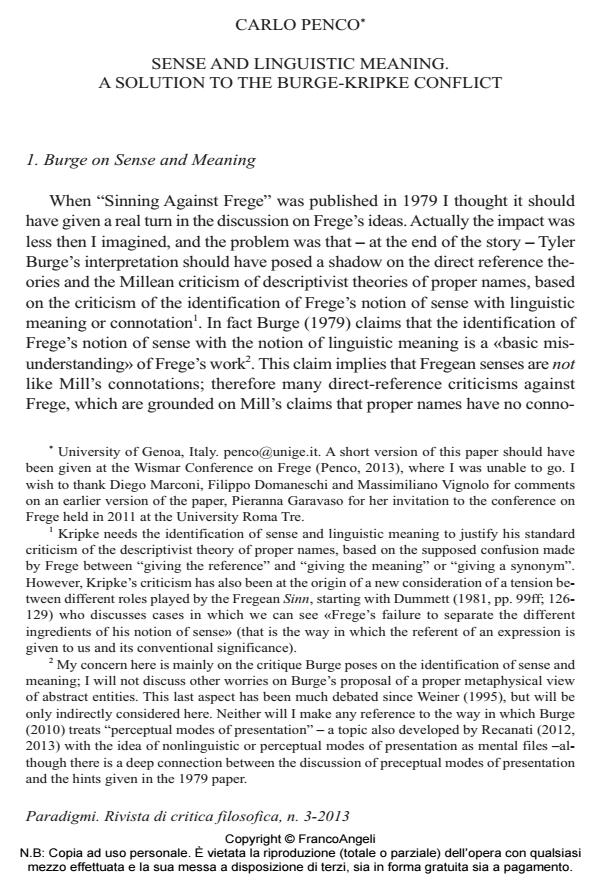Sense and linguistic meaning. A solution to the Burge-Kripke conflict
Titolo Rivista PARADIGMI
Autori/Curatori Carlo Penco
Anno di pubblicazione 2014 Fascicolo 2013/3
Lingua Inglese Numero pagine 15 P. 75-89 Dimensione file 100 KB
DOI 10.3280/PARA2013-003006
Il DOI è il codice a barre della proprietà intellettuale: per saperne di più
clicca qui
Qui sotto puoi vedere in anteprima la prima pagina di questo articolo.
Se questo articolo ti interessa, lo puoi acquistare (e scaricare in formato pdf) seguendo le facili indicazioni per acquistare il download credit. Acquista Download Credits per scaricare questo Articolo in formato PDF

FrancoAngeli è membro della Publishers International Linking Association, Inc (PILA), associazione indipendente e non profit per facilitare (attraverso i servizi tecnologici implementati da CrossRef.org) l’accesso degli studiosi ai contenuti digitali nelle pubblicazioni professionali e scientifiche.
L‘autore applica una nota tensione tra aspetti cognitivi e semantici della nozione fregeana di senso alla discussione sugli indicali e discute dapprima l’attacco di Burge contro l’identificazione di senso e significato e la risposta di Kripke a favore di tale identificazione. Dopo avere mostrato gli aspetti problematici di entrambe le interpretazioni, l’autore sostiene che la tensione presente nel concetto fregeano di senso (semantico e cognitivo) aiuta a capire le difficoltà di entrambi i punti di vista e alcune tesi apparentemente contraddittorie di Frege sull’identità di senso di enunciati con indicali. L’autore conclude che la nozione fregeana di senso, anche nei suoi aspetti cognitivi, non può essere ricondotta a quella di significato linguistico e che la tensione fregeana tra due nozioni di senso può anche spiegare la discussione che Frege fa sull’indicale "io", usando la proposta di trattare le dimostrazioni come parte del senso degli indicali.
Parole chiave:Indicali, Dimostrazioni, Senso e significato, Frege, Burge, Kripke.
- CONCEPTUALIZATION OF THE SENSE IN G. FREGE’S LOGICAL SEMANTICS Evgeniy V. Gluschenko, in The Journal of V. N. Karazin Kharkiv National University, Series "The Theory of Culture and Philosophy of Science" /2021 pp.39
DOI: 10.26565/2306-6687-2021-63-05
Carlo Penco, Sense and linguistic meaning. A solution to the Burge-Kripke conflict in "PARADIGMI" 3/2013, pp 75-89, DOI: 10.3280/PARA2013-003006